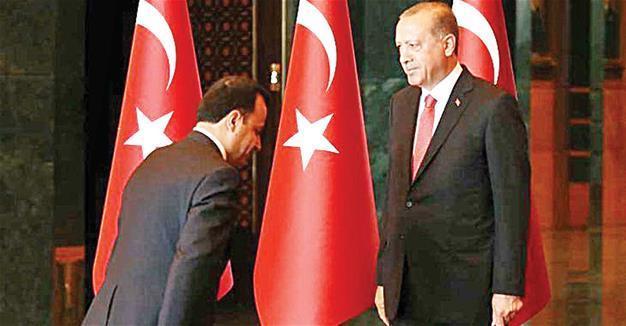As Turkey’s top judge bows before the president

Only a handful of people in judicial circles and the media criticized Constitutional Court head Zühtü Arslan for bowing before President Tayyip Erdoğan out of respect during Turkey’s Victory Day celebrations on Aug. 30.
Judges Union head Mustafa Karadağ said such a move was “not appropriate” for the top judge, “even out of politeness.” Ankara Bar Association head Hakan Canduran said the picture is simply more “evidence that the courts are not independent.”
On the same day, however, Council of State head Zerrin Güngör criticized the main opposition Republican People’s Party (CHP) over its recent “Justice Congress,” which it held from Aug. 26-29 to “draw attention to injustice.” “The CHP is disappointed,” Güngör told a reporter. “It used to get help from the judiciary because of its political weakness. But now the judiciary has never been more independent than it is today.”
“If she wants to get involved in political affairs,” said CHP deputy Levent Gök in response, “she should take her judges’ robe off and enter politics. This is the mentality we object to. You cannot judge court cases when you bow before political power.”
Coincidentally, on the same day the European Court of Human Rights (ECHR) approved an application by Council of Europe (CoE) Human Rights Commissioner Nils Muiznieks to become an intervening party in the court cases of Turkish journalists and writers who have been waiting for their trial for around a year.
Muizniek’s application to the ECHR was based on his earlier February 2017 report on Turkey, in which he said the judicial system was manipulated by the ruling Justice and Development Party (AK Parti) through the newly founded “criminal courts of peace.” In his 25-page report, the commissioner also noted that freedom of expression and freedom of the media were deteriorating in Turkey, especially under the state of emergency declared after the July 15, 2016 coup attempt. He particularly referred to the dominant role of President Erdoğan in this picture.
A poll commissioned by the AK Parti during CHP leader Kemal Kılıçdaroğlu’s “Justice March,” which took place on June 15 to July 9 from Ankara to Istanbul, showed that three-quarters of Turkish people have no trust left in the justice system.
Justice Minister Abdülhamit Gül even admitted the incapacity of the judiciary in the country, while trying to explain why the government had to call the military judges of abolished military courts to serve in public courts.
That incapacity is partly due to the dismissal of nearly a third of prosecutors and judges since the coup attempt, mostly due to their alleged links with the illegal network of U.S.-resident Islamist preacher Fethullah Gülen, a former ally of Erdoğan but now accused of masterminding the coup attempt.
The vacuum created by the dismissal of judges and prosecutors with alleged Gülen links is now being somewhat filled by new officials with alleged links to other Islamic groups close to Erdoğan’s AK Parti. These include the Menzil group, the İskenderpaşa group and the İsmailağa group. The situation is even more worrying in the police force, and some of these groups are also organized within Turkey’s right-wing nationalist parties.
It has been reported that when former Justice Minister Sadullah Ergin told Erdoğan after the 2010 referendum that reshaping the judiciary had enabled it to become dominated by Gülenists, Erdoğan reportedly told him not to worry, as “they pray to the same kiblah.” The implication was that the fact that the Gülenists were observant Muslims was enough to provide protection.
Following the July 15, 2016 coup attempt, Erdoğan asked for “forgiveness from God and people,” saying he had been “deceived” by the Gülenists.
Today, we should question whether these new religious-based groupings, with all their different allegiances, will not also try to deceive the AK Parti government. After all, they are not exactly transparent groups who are accountable before law.
Erdoğan often tells crowds at public rallies “not to bow before anyone but Allah.” But an increasing number of people are bowing before him, apparently now including Turkey’s highest judge. After all Turkey has gone through in recent years, Erdoğan should be doubly careful about who bows before him these days.
 Only a handful of people in judicial circles and the media criticized Constitutional Court head Zühtü Arslan for bowing before President Tayyip Erdoğan out of respect during Turkey’s Victory Day celebrations on Aug. 30.
Only a handful of people in judicial circles and the media criticized Constitutional Court head Zühtü Arslan for bowing before President Tayyip Erdoğan out of respect during Turkey’s Victory Day celebrations on Aug. 30.